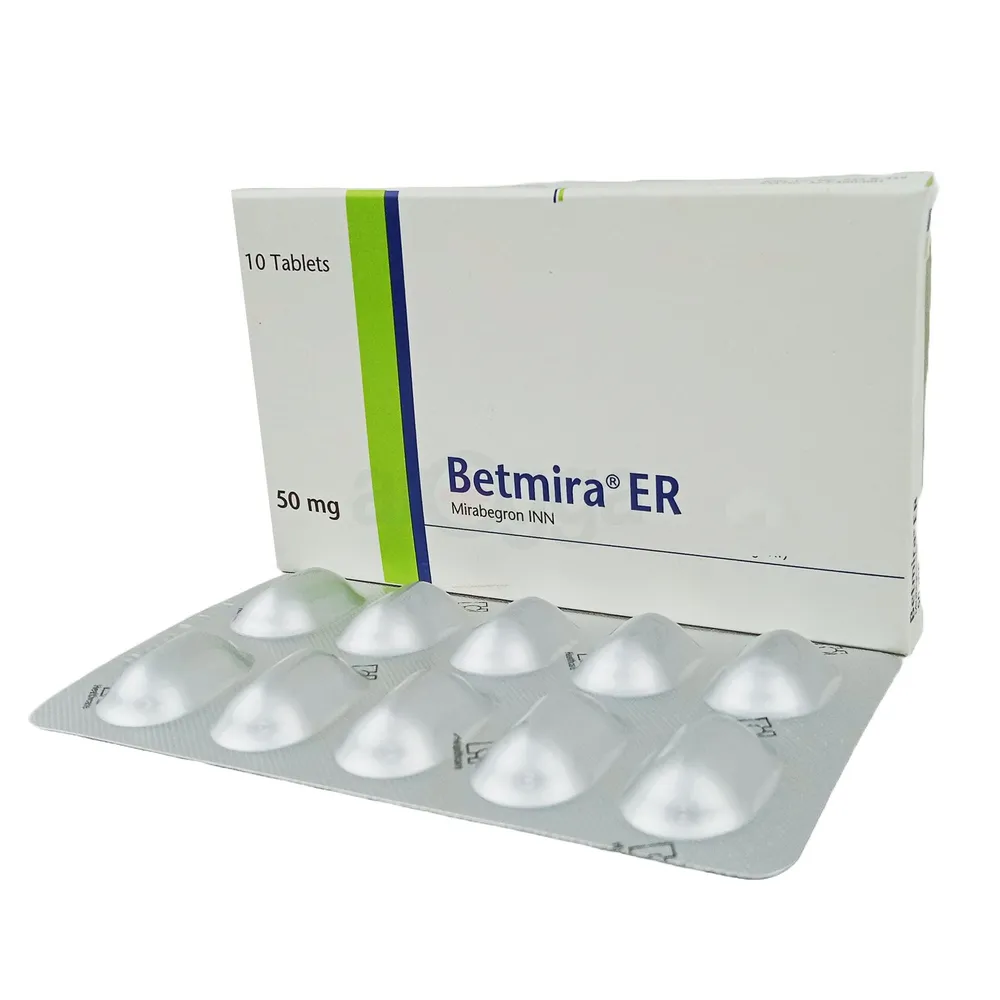

12-24 Hours
ব্যবসার জন্য পাইকারি দামে পণ্য কিনতে রেজিস্টেশন করুন
Register
0 People recently viewed this
Betmira ER 50
Healthcare Pharmaceuticals Ltd.
Generic: Mirabegron
Safety Advices
বাংলা
English
CAUTION
Caution is advised when consuming alcohol with Betmira ER 50. Please consult your doctor.
CONSULT YOUR DOCTOR
Betmira ER 50 may be unsafe to use during pregnancy. Although there are limited studies in humans, animal studies have shown harmful effects on the developing baby. Your doctor will weigh the benefits and any potential risks before prescribing it to you. Please consult your doctor.
CONSULT YOUR DOCTOR
Betmira ER 50 is probably unsafe to use during breastfeeding. Limited human data suggests that the drug may pass into the breastmilk and harm the baby.
SAFE
Betmira ER 50 does not usually affect your ability to drive.
CAUTION
Betmira ER 50 should be used with caution in patients with severe kidney disease. Dose adjustment of Betmira ER 50 may be needed. Please consult your doctor.
CAUTION
Betmira ER 50 should be used with caution in patients with liver disease. Dose adjustment of Betmira ER 50 may be needed. Please consult your doctor.
Use of Betmira ER 50 is not recommended in patients with severe liver disease.
Medicine Overview of Betmira ER 50mg Tablet
Introduction
Betmira ER 50 is used to treat symptoms of overactive bladder that includes increased or frequent urination, urgent need to urinate and inability to control urination. It helps to relax the muscle surrounding the bladder and increase it's ability to store urine. Betmira ER 50 is advised to take it in a dose and duration as per prescription. It can be taken with or without food. Swallow the medicine as a whole without crushing or chewing it. You should not stop taking the medicine without consulting the doctor as it may lead to the worsening of your symptoms. The course...
... Show moreUses of Betmira ER 50
- Overactive bladder (OAB) symptoms
Side effects of Betmira ER 50
Common
- Constipation
- Headache
- High blood pressure
- Nasal inflammation
- Urinary tract infection
How to use Betmira ER 50
Take this medicine in the dose and duration as advised by your doctor. Swallow it as a whole. Do not chew, crush or break it. Betmira ER 50 may be taken with or without food, but it is better to take it at a fixed time.
How Betmira ER 50 works
Betmira ER 50 is a beta 3-receptor agonist. It works by activating the receptor in the bladder, causing the bladder muscles to relax. It prevents frequent, urgent or uncontrolled urination.
Quick Tips
- Mirago 50 Tablet ER helps you to have better control over your urination. It relaxes your bladder which increases its capacity to hold urine thereby reducing the need to pass urine.
- It causes less drowsiness and constipation than other medicines for overactive bladder.
- It may raise your blood pressure. Monitor your blood pressure regularly.
- Do not stop taking this medicine if you do not notice an improvement in your symptoms as it may take some time for your bladder to adapt and your symptoms to improve.
Brief Description
Indication
Overactive bladder, with symptoms of urge urinary incontinence, urgency, and urinary frequency
Administration
May be taken with or without food: Swallow whole, do not chew/divide/crush.
Adult Dose
Overactive Bladder
Indicated for overactive bladder with symptoms of urge urinary incontinence, urgency, and urinary frequency
25 mg PO qDay
25 mg dose is typically effective within 8 weeks
May increase to 50 mg PO qDay based on individual efficacy and tolerability
Hepatic impairment
Moderate (Child-Pugh B): Not to exceed 25 mg/day
Severe (Child Pugh C): Not recommended
Renal Dose
Renal impairment
Severe (CrCl 15-29 mL/min): Not to exceed 25 mg/day
ESRD: Not recommended
Contraindication
Hypersensitivity. Severe uncontrolled HTN.
Mode of Action
Beta-3 adrenergic receptor agonist which causes relaxation of the detrusor smooth muscle of the urinary bladder and increases bladder capacity.
Precaution
End-stage renal disease, severe renal impairment; moderate (Child-Pugh Class B) & severe hepatic impairment (Child-Pugh Class C); severe uncontrolled HTN. Known history of QT prolongation or taking medicines known to prolong QT interval; bladder outlet obstruction & taking antimuscarinic medications for OAB. Women of childbearing potential not using contraception. Pregnancy & lactation. Childn <18 yr.
Lactation: Unknown whether distributed in breast milk; excretion in breast milk possible; discontinue nursing or the drug taking into account the importance of the drug to the mother
Side Effect
>10%
Elevated BP occurring predominantly in patients with preexisting hypertension (7-11%)
1-10%
Dry mouth (3-9%),Nasopharyngitis (3-4%),UTI (3-6%),Headache (2-4%),Influenza (2-3%),Constipation (2-3%),Dizziness (2%),Arthralgia (2%),Cystitis (2%),Back pain (1-3%),Sinusitis (1-3%),URTI (1-2%),Arthralgia (1-2%),Diarrhea (1-2%),Tachycardia (1-2%),Fatigue (1%),Abdominal pain (0-1%),Reports of neoplasms (0-1%)
<1%
Cardiac disorders (eg, palpitations, elevated BP),Eye Disorders (eg, glaucoma, blurry vision),GI disorders (eg, dyspepsia, gastritis, abdominal distension),Rhinitis,Elevations in GGT, AST, ALT, LDH,
Renal and urinary disorders (eg, nephrolithiasis, bladder pain),
Reproductive system disorders (eg, vulvovaginal pruritis, vaginal infection)
Skin and subcutaneous tissue disorders (eg, urticaria, leukocytoclastic vasculitis, rash, pruritus, purpura, lip edema)
Stevens-Johnson syndrome associated with increased serum ALT, AST and bilirubin
Interaction
Increased AUC of strong CYP3A/P-gp inhibitors eg, ketoconazole, itraconazole, ritonavir, clarithromycin. Decreased plasma conc by CYP3A/P-gp inducers. Increased Cmax & AUC of metoprolol, despiramine & digoxin. Thioridazine, type 1C antiarrhythmics (eg flecainide, propafenone), TCAs. Potential P-gp inhibition of dabigatran.
ব্যবসার জন্য পাইকারি দামে পণ্য কিনতে রেজিস্টেশন করুন
Register